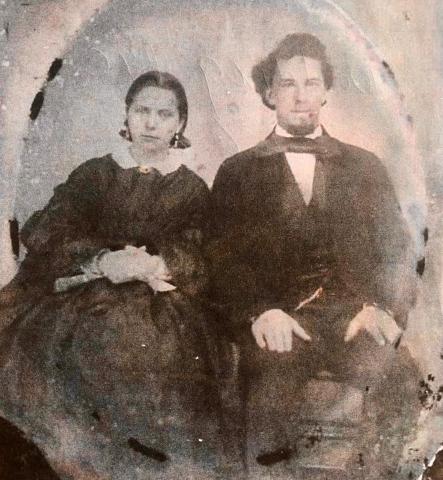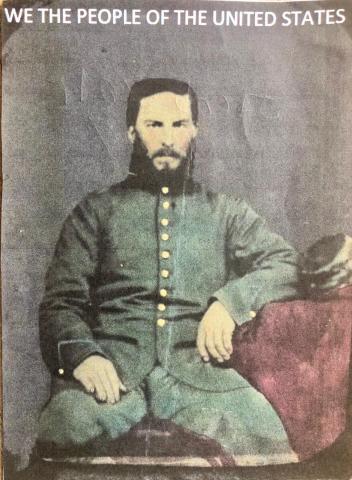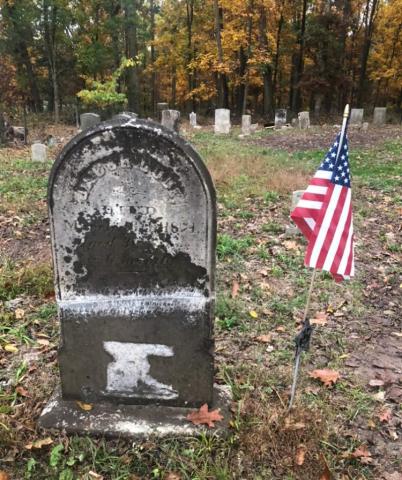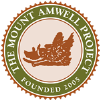To say that little is known about the lives and deaths of those buried in Woodschurch Cemetery is an understatement. In fact, almost nothing is known about those 100 or so men, women and children resting there, just north of Flemington, since they died between 1840 and 1920.
Well, that was the case until 2018 when a U.S. Navy veteran and New Jersey history enthusiast, Dennis Graney, had an accidental ‘meeting’ with Woodschurch Cemetery. One day while driving along Woodschurch Road after dropping his grandson off at Deer Path Park, Mr Graney was naturally forced to slow down at the dangerous bend in the road. Suddenly, the corner of his eye was caught by a small U.S. flag on a stick in the ramshackle cemetery, which was still overgrown with trees and brush.
As a Navy veteran, Mr Graney has an ardent reverence for our flag and the memory of all who served. So, he felt compelled to investigate, and thus began a two-year odyssey involving other members of his family to save Woodschurch Cemetery and to learn about the life of that forgotten veteran.
Thanks to Mr Graney’s persistence, research and sleuthing skills, a lost chapter in Hunterdon County history has been uncovered and can be celebrated. Under that American flag near the center of Woodchurch Cemetery lie the remains of a Civil War soldier, Private Jacob Cole. Next to him is the grave of a small child, Horace Cole. At first glance, you might think they are father and son, yes? Apparently not, Mr Graney has learned. In fact, they’re cousins and have the same grandfather, Jacob O. Cole.
Who was Private Cole? Before the Civil War, he was a blacksmith, a skill that he probably learned from a neighbor. We know he couldn’t have learned the craft from his father, Michael Cole, because he died in 1841 while Jacob was still a child. His mother, Gertrude Van Nest, was left alone to care for Jacob and her other children. Remember, this was an era before state welfare, food stamps and subsidized housing.
Gertrude, however, most likely could count on assistance from neighbors and fellow church members. Still, people back then were a different caliber than today. They found a way to survive, went to work and didn’t play the victim. Gertrude’s life was hard, and she also had to bury her son, Jacob, in 1871, when he succumbed to tuberculosis. She lived until 1881.
What else do we know about Jacob? Sometime in the mid 1850s, he married a local girl, the beautiful Catherine Allegar Cole. Their relationship was clearly a touching love story. She bore him five children, but as tragically common in the pre-modern world, child mortality was high and only two daughters survived to adulthood.
As we know, the nation plunged into Civil War in April 1861. In summer 1862, Jacob answered the call of duty, enlisting as a private in Company H, New Jersey Volunteers, along with his wife’s two brothers, George and Peter Allegar. They signed on for 1-year tours, the norm at the time.
Together with Jacob, the Allegar brothers found themselves at Fredericksburg, Virginia under the command of General Ambrose Burnside, and soon after, they participated in the infamous ‘Mud March’ of January 1863.
In mid December 1862, General Burnside wanted to force his way to the Confederate capital, Richmond, Virginia, by crossing the Rappahannock River at Fredericksburg, but his army was routed by General Lee and the Confederate army.
The so-called ‘Mud March’ a month later was General Burnside’s second attempt at crossing the river to take Fredericksburg, but it failed because of squabbling among his officers, as well as due to severe winter storms that left the Union Army stalled in a muddy quagmire under heavy rains. When the plan failed General Burnside was replaced by General ‘Fighting Joe’ Hooker.
That grueling ‘Mud March’ left George Allegar very ill. He was discharged and sent home as “unfit for duty”. Jacob Cole continued onward, even though he was just as ill as his brother-in-law. The march apparently broke his health forever, but more suffering was to follow.
In April 1863, Jacob and his New Jersey regiment were present at the Union Army staging site near Belle Plain, Virginia on the Potomac River where there was a grand review of the troops by President Lincoln. General Hooker was now in command.
A few weeks later, the Union Army was again near Fredericksburg, this time at Chancellorsville, a few miles west of the city. Hooker used the inexperienced NJ 30th to guard his left flank when crossing the river.
The Confederates attacked with cannon and forced the poorly trained NJ 30th back across the river. The maneuver was a debacle and Jacob was injured, losing his left leg below the knee. Somehow he made it off the battlefield alive and survived to return to Hunterdon County.
Jacob came home a man broken by the war, as we can see in his photo, and eight years later he died, in 1871. His widowed Catherine soon remarried into the local Swarer family. In what can only be seen as a touching gesture to the memory of her first husband, Catherine named her new son “Jacob Cole Swarer”.
Catherine, a devout woman who regularly attended church, outlived her second husband and lived into the early 20th century. At first, Mr Graney had no idea where her grave was located, but thanks to his effort and persistence we now know that she’s buried in the Woodschurch Cemetery, next to her first love and husband, Jacob Cole.
Confirming that Catherine was next to Jacob took some sleuthing. Together with Bob Leith, chairman of the Hunterdon County Historical Society Cemetery Committee, Mr Graney probed the depression next to the grave of Jacob Cole, suspecting it to be the result of a collapsed coffin long interred, and it was found to be just that.
Then, research at the Hunterdon County Library revealed an obituary for "Catherine Cole Swarer" in a 1913 edition of the newspaper, Hunterdon Democrat. At the end of the obit, it stated "Burial in Barley Sheaf". In 1913, the only cemetery in Barley Sheaf was Woodschurch Cemetery.
Based on the results of this research, Catherine's great, great granddaughter, Joyce Kintzel, arranged for a gravestone to be made and placed on the site. While their marriage and family was tragically cut short by the Civil War, Private Jacob and his bride Catherine are together for eternity in Woodschurch Cemetery.



Thanks to Mr Graney’s persistence, research and sleuthing skills, a lost chapter in Hunterdon County history has been uncovered and can be celebrated. Under that American flag near the center of Woodchurch Cemetery lie the remains of a Civil War soldier, Private Jacob Cole.
